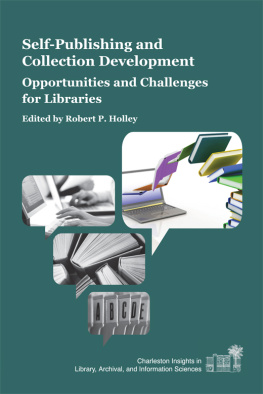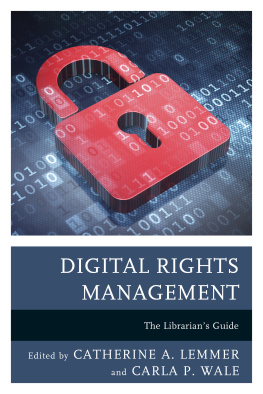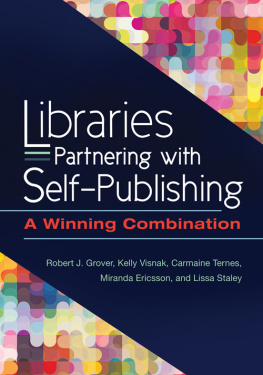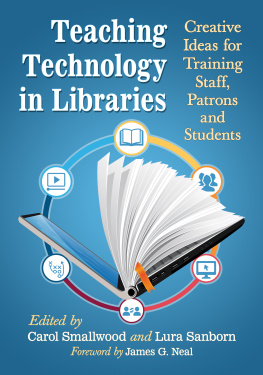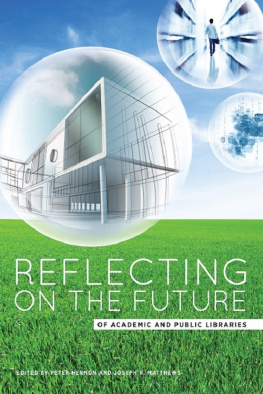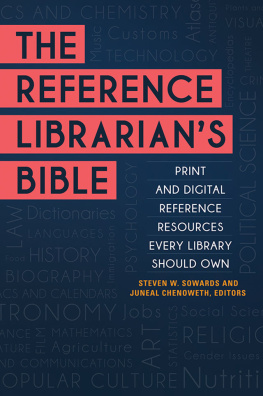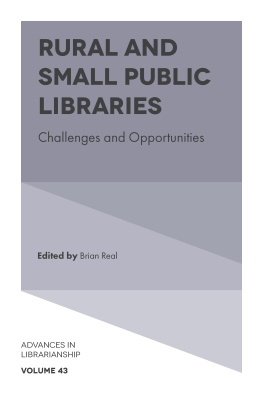Robert P. Holley - Self-Publishing and Collection Development: Opportunities and Challenges for Libraries
Here you can read online Robert P. Holley - Self-Publishing and Collection Development: Opportunities and Challenges for Libraries full text of the book (entire story) in english for free. Download pdf and epub, get meaning, cover and reviews about this ebook. year: 2015, publisher: Purdue University Press, genre: Art. Description of the work, (preface) as well as reviews are available. Best literature library LitArk.com created for fans of good reading and offers a wide selection of genres:
Romance novel
Science fiction
Adventure
Detective
Science
History
Home and family
Prose
Art
Politics
Computer
Non-fiction
Religion
Business
Children
Humor
Choose a favorite category and find really read worthwhile books. Enjoy immersion in the world of imagination, feel the emotions of the characters or learn something new for yourself, make an fascinating discovery.
- Book:Self-Publishing and Collection Development: Opportunities and Challenges for Libraries
- Author:
- Publisher:Purdue University Press
- Genre:
- Year:2015
- Rating:5 / 5
- Favourites:Add to favourites
- Your mark:
Self-Publishing and Collection Development: Opportunities and Challenges for Libraries: summary, description and annotation
We offer to read an annotation, description, summary or preface (depends on what the author of the book "Self-Publishing and Collection Development: Opportunities and Challenges for Libraries" wrote himself). If you haven't found the necessary information about the book — write in the comments, we will try to find it.
The current publishing environment has experienced a drastic change in the way content is created, delivered, and acquired, particularly for libraries. With the increasing importance of digital publishing, more than half the titles published in the United States are self-published. With this growth in self-published materials, librarians, publishers, and vendors have been forced to rethink channels of production, distribution, and access as it applies to the new content. Self-Publishing and Collection Development: Opportunities and Challenges for Libraries will address multiple aspects of how public and academic libraries can deal with the increase in self-published titles.
While both academic and public libraries have started to grapple with the burgeoning issues associated with self-published books, many difficulties remain. To develop effective policies and procedures, stakeholders must now tackle questions associated with the transformation of the publishing landscape. Obstacles to self-publishing include the lack of reviews, the absence of cataloging and bibliographic control, proprietary formats for e-books, and the difficulty for vendors in providing these works.
General chapters will include information on reviewing sources, cataloging and bibliographic control, and vendor issues. Information addressing public libraries issues will highlight initiatives to make self-published materials available at the Los Gatos Public Library in California and the Kent District Library in Michigan. Chapters on academic library issues will address why self-published materials are important for academic institutions, especially those with comprehensive collecting interests. Several self-published authors focus on how they attempt to make their works more suitable for public libraries. Finally, the book concludes with a bibliographic essay on self-publishing.
As the term traditional publishing begins to fade and new content producers join the conversation, librarians, publishers, and vendors will play an important role in facilitating and managing the shift.
Robert P. Holley: author's other books
Who wrote Self-Publishing and Collection Development: Opportunities and Challenges for Libraries? Find out the surname, the name of the author of the book and a list of all author's works by series.

